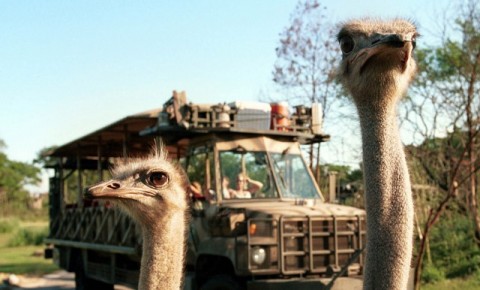
This is the latest in a series of articles on Theme Park Tourist in which we'll talk to Cast Members at Walt Disney World to understand their roles and the part that they play in "creating the magic" for guests. The interviews will offer an insight into Cast Members' day-to-day roles, the training that they undergo and the aspects of their jobs that they find the most rewarding. We might even uncover a funny story or two. Kilimanjaro Safaris is a live safari adventure that embodies the heart of what Animal Kingdom was built to be. The ride was one of the opening day attractions at the park, and continues to be one of its most popular draws. The signature attraction at the park, Kilimanjaro Safaris takes guests on a real off-roading adventure past real animals (with seemingly no fences) that takes place on a parcel of land equal in size to the entire Magic Kingdom park. Among the animals that are on show are lions, elephants, giraffes, zebras, rhinoceros and cheetahs. The Cast Members that work on Kilimanjaro Safaris play a crucial role in the ride experience. In particular, they are responsible for actually driving the safari trucks, and for pointing out the various animals en route. It's one of the most unique and coveted roles at Walt Disney World - where else can you go on a mini-safari every single day? Amy Ziese worked as an Attractions Cast Member on Kilimanjaro Safaris in 2006 (Amy has previously shared with us her experiences of working as a Housekeeping Cast Member). She was kind enough to speak with Theme Park Tourist about her experiences of working on the ride - and you can read her thoughts below.
Landing the role
Amy was working on the Dinosaurattraction at Disney's Animal Kingdom when she was told that Kilimanjaro Safaris (KSR to Cast Members, for Kilimanjaro Safari Ride) was short-staffed: "Anyone who was interested could be cross trained and eventually transfer to work over there. I’ve always loved KSR and was excited to try a spieling role, not to mention the thrill of working on an attraction with live animals. One of my managers at Dinosaur had previously worked there and encouraged me to go for it."
Training up
Since Amy was a cross-train from Dinosaur, she had already completed Daklamation, which is the class for new hires at Animal Kingdom. She went straight into attractions training for Kilimanjaro Safaris: " We began by practicing the spiel while we were off the truck and driving the truck without worrying about talking. After a couple days of that, we put it all together and once we were able to take a couple solid trips, we started going with guests on the truck."
"I trained along with one other person, who was also a cross-train from Dinosaur. For some trips we would take turns with one of us spieling and the other one driving to help us get the hang of it. She was a better driver and I was stronger at spieling, so she would practice talking while I focused on driving for several trips. We also had to learn all the positions off the truck, but these were much easier, particularly since we had both worked in attractions previously."
Day-to-day duties
Working on Kilimanjaro Safaris wasn't simply a case of driving the safari trucks all day long: "Every KSR cast member rotates through all the positions. So you take your turn on the truck, but you’ll also work as a greeter, grouper, strollers, and other positions. Every day was different so you never knew exactly what positions you would land most or when."
The rules
There were a number of rules and guidelines that Amy had to follow, particularly related to the safety of guests and the animals on the mock savannah. "Since you’re really driving a free-roaming truck on KSR, it’s essential that you follow all the safety guidelines for doing so." 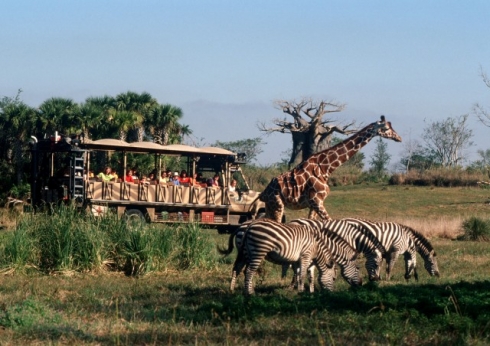
"Obviously driving the truck is one of the most challenging positions. While you’re trying to spot all the animals and point them out to guests, you’re also maintaining the appropriate distance between yourself and the next truck, keeping an eye on guests to make sure they stay seated, slowing down just enough for guests to try and get some great pictures, and keeping an ear on the radio in case there are any special situations (like animals in the road that will slow you down and keep you stuck in one area for awhile)."
The "old" Kilimanjaro Safaris
Though the basic premise of Kilimanjaro Safaris has remained the same since opening day, the storyline has changed significantly. Before the ride opening to the public, it told the grisly tale of an elephant that had been poached. It even included a model of the elephant's bloody carcass, visibly missing its prized tusks. Testers found the scene too disturbing for a Disney attraction, and it was removed prior to the official opening of Disney's Animal Kingdom. After the corpse was pulled, it was briefly stored backstage. Amy recalls: "One unconfirmed story some Cast Members have heard even tells of a local pilot who saw the fake corpse while flying over the park and tried to report Disney for inhumane treatment, believing the dead elephant laying backstage to be real." 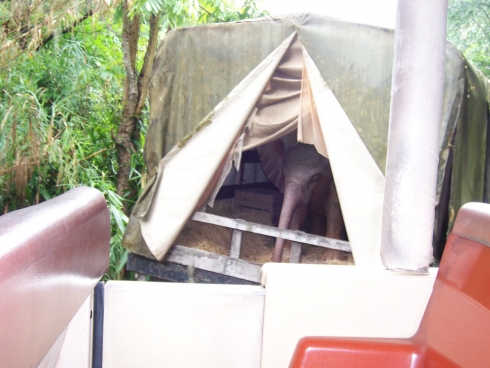
Image: Gregg Regula, Flickr
When the ride opened to the public, it retained the story that included the disappearance of "Big Red" but didn't show the elephants death. It did, though, include a fake elephant known as "Little Red", who was "rescued" by the guests on the safari. This version of the ride included a fast, bumpy chase in which the guests pursued and stopped the poachers and evetyone went home with a compelling lesson about the dangers of poaching in Africa. The chase was one of Amy's favorite parts of the attraction: "I was lucky enough to work KSR when the bridge was moving and you got to chase down the poachers, so there was a lot of bumpy driving and a thrilling element of urgency there at the end when you could really get into the role of tracking those poachers down." In 2007, the story was toned down. The guests were told of a baby elephant wandering the park and were asked to keep an eye out for it. Though they still found the elephant and briefly encountered the poachers, the message wasn't so stark. Finally, in 2012, Kilimanjaro Safaris lost the last lingering message about the harsh realities of poaching in Africa. Poachers and Baby Red have disappeared along with all radio chatter between the tour guide and the game warden that warned of poaching and set up any kind of story line. The bumpy chase is long gone, and even the unstable bridge that would rock from side to side remains stubbornly secure.
The trucks
Kilimanjaro Safaris trucks are very real. "It's not a secret, but I think a lot of guests didn’t really believe that the trucks were free-moving," says Amy. "We take them off the ride path and park them in a big parking lot backstage every night. They don’t go very fast, so it’s agonizing taking them on and off and driving the backstage roads at that pace, but they are absolutely real, free-moving trucks."
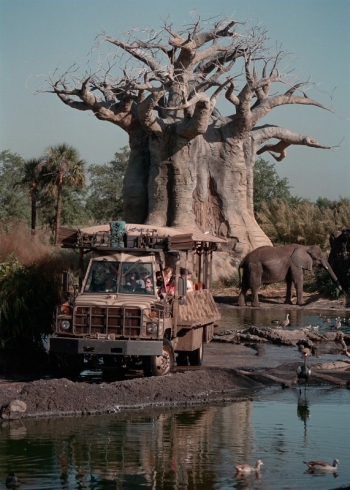
The reason that the trucks don't simply cycle around on a track is very simple: "The animals here are free roaming. Drivers will often need to swerve to one side of the road or another to scoot past a stubborn giraffe. While they can’t leave the road entirely, there’s enough wiggle room to help them navigate the savannah safely."
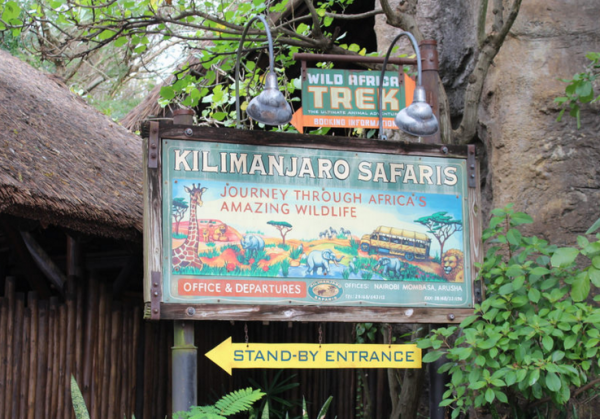

Comments
Yep . . . bridge definitely moves!
Just to clarify- this article is obviously a little old and should be updated. On the current Safari attraction drivers are constantly talking about conservation and the need to help protect animals in Africa and here at home. The "poaching" part was taken out of what we say so that guests could have more time taking pictures of the animals as it is a Photo Safari above all else. Yes, the bridge does work and we know if it is going to tilt when we get to that part. Disney's Animal Kingdom is focused on raising awareness of the plights of the animals around the world who are being hunted even today. For example: the Bongos that are on the reserve are two of the Bongos on reservations around the world. They were hunted to near extinction by poachers for their horns. Conservation efforts and reserves such as KSR are the only reason that Bongos even exist today. While Safari is a great ride as far as being an attraction, keep in mind that it's also educational and meant to teach, raise awareness and let you, the guests, take pictures of animals you might never have had a chance to see in your lifetime.
Thanks Elizabeth. Just to clarify - this article will be updated at some stage, although I think most of Amy's recollections are accurate (of course, things have moved on in the time since she left Disney).
i was there last week and took my friend who has never been on the ride and when I was expecting the one part to happen I told her to hold tight to her phone because the exciting bumpy part was coming. She looked at me when it was done and said it was the same. I was disappointed that the part was gone for good.
They still have the bridge that moves side to side. It isn't always operating, but I've been on it recently when did. So, it's hit or miss.